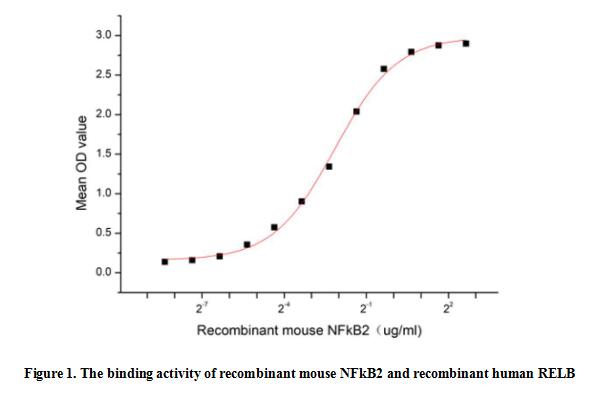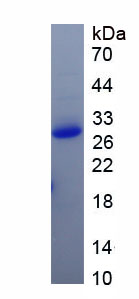Active Nuclear Factor Kappa B2 (NFkB2)
LYT-10; H2TF1; Lymphocyte translocation chromosome 10; Nuclear Factor Of Kappa Light Polypeptide Gene Enhancer In B-Cells 2(p49/P100); Nuclear factor NF-kappa-B p52
- Product No.APB825Mu01
- Organism SpeciesMus musculus (Mouse) Same name, Different species.
- Buffer FormulationPBS, pH7.4, containing 0.01% SKL, 5% Trehalose.
- Traits Freeze-dried powder
- Purity> 90%
- Isoelectric Point10.0
- ApplicationsCell culture; Activity Assays.
- DownloadInstruction Manual
- UOM 10µg50µg 200µg 1mg 5mg
- FOB
US$ 212
US$ 530
US$ 1060
US$ 3180
US$ 7950
For more details, please contact local distributors!
ACTIVITY TEST

Nuclear Factor kappa B2 (NFkB2), also known as p100, is a subunit of the NF-kappa B (NFkB) family of transcription factors. NFkB2 plays an important role in immune response and inflammation. It is involved in regulating the expression of a variety of genes, including those encoding cytokines, chemokines, adhesion molecules, and acute phase response proteins. RELB-NFkB2 heterodimer regulates the expression of genes associated with immune response and inflammation in cells. Thus a functional binding ELISA assay was conducted to detect the interaction of recombinant mouse NFkB2 and recombinant human RELB. Briefly, NFkB2 was diluted serially in PBS with 0.01% BSA (pH 7.4). Duplicate samples of 100 μl were then transferred to RELB-coated microtiter wells and incubated for 1h at 37℃. Wells were washed with PBST and incubated for 1h with anti-NFkB2 pAb, then aspirated and washed 3 times. After incubation with HRP labelled secondary antibody for 1h at 37℃, wells were aspirated and washed 5 times. With the addition of substrate solution, wells were incubated 15-25 minutes at 37℃. Finally, add 50 µL stop solution to the wells and read at 450/630 nm immediately. The binding activity of recombinant mouse NFkB2 and recombinant human RELB was shown in Figure 1, the EC50 for this effect is 0.23 ug/mL.
USAGE
Reconstitute in 10mM PBS (pH7.4) to a concentration of 0.1-1.0 mg/mL. Do not vortex.
STORAGE
Avoid repeated freeze/thaw cycles. Store at 2-8°C for one month. Aliquot and store at -80°C for 12 months.
STABILITY
The thermal stability is described by the loss rate. The loss rate was determined by accelerated thermal degradation test, that is, incubate the protein at 37°C for 48h, and no obvious degradation and precipitation were observed. The loss rate is less than 5% within the expiration date under appropriate storage condition.
GIVEAWAYS
INCREMENT SERVICES
-
 BCA Protein Quantification Kit
BCA Protein Quantification Kit
-
 Molecular Mass Marker for Protein
Molecular Mass Marker for Protein
-
 Monoclonal Antibody Customized Service
Monoclonal Antibody Customized Service
-
 Polyclonal Antibody Customized Service
Polyclonal Antibody Customized Service
-
 Protein Activity Test Experiment Service
Protein Activity Test Experiment Service
-
 Electrophoretic Mobility Shift Assay (EMSA) Experiment Service
Electrophoretic Mobility Shift Assay (EMSA) Experiment Service
-
 Buffer
Buffer
-
 Lentivirus Packaging Experiment Service
Lentivirus Packaging Experiment Service
-
 Adenovirus Packaging Experiment Service
Adenovirus Packaging Experiment Service
-
 Real Time PCR Experimental Service
Real Time PCR Experimental Service
-
 Spike RBD Protein (S-RBD)
Spike RBD Protein (S-RBD)
-
 Protein G
Protein G
-
 Protein A
Protein A
| Catalog No. | Related products for research use of Mus musculus (Mouse) Organism species | Applications (RESEARCH USE ONLY!) |
| RPB825Mu01 | Recombinant Nuclear Factor Kappa B2 (NFkB2) | Positive Control; Immunogen; SDS-PAGE; WB. |
| APB825Mu01 | Active Nuclear Factor Kappa B2 (NFkB2) | Cell culture; Activity Assays. |
| RPB825Mu02 | Recombinant Nuclear Factor Kappa B2 (NFkB2) | Positive Control; Immunogen; SDS-PAGE; WB. |
| PAB825Mu02 | Polyclonal Antibody to Nuclear Factor Kappa B2 (NFkB2) | WB; IHC; ICC; IP. |
| PAB825Mu01 | Polyclonal Antibody to Nuclear Factor Kappa B2 (NFkB2) | WB |
| LAB825Mu81 | FITC-Linked Polyclonal Antibody to Nuclear Factor Kappa B2 (NFkB2) | WB; IHC; ICC; IF. |
| LAB825Mu71 | Biotin-Linked Polyclonal Antibody to Nuclear Factor Kappa B2 (NFkB2) | WB |
| SEB825Mu | ELISA Kit for Nuclear Factor Kappa B2 (NFkB2) | Enzyme-linked immunosorbent assay for Antigen Detection. |
| LMB825Mu | Multiplex Assay Kit for Nuclear Factor Kappa B2 (NFkB2) ,etc. by FLIA (Flow Luminescence Immunoassay) | FLIA Kit for Antigen Detection. |







